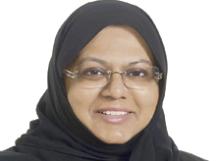WHEN Uzma Raheem graduated in Turkey with a Master’s degree in Clinical Psychology, she had no idea that her destiny was to work with children with exceptional needs – her speciality was working with adult schizophrenics. She is from India but she came to Saudi Arabia as an infant with her parents and attended the International Indian School. “Saudi Arabia is home to me – I am not comfortable anywhere else.”
Her first job in Saudi Arabia was at Tender Loving Care, a rehabilitation center for Arabic speaking children. After nine months, she resigned: “I realized that there were no centers for children and families who cannot speak Arabic.” She began taking children for therapy at home on an hourly basis and her time was quickly filled up. “Then the summer holidays came and I found myself thinking: ‘What am I going to do? I am going to get so bored!’ So I started a small summer group in my house. We had nine children, all with a disability or disorder, and we just had fun together, there was nothing commercial about it.”
After the summer, some children went back to school, and others back to watching TV at home. “This is common among children with disabilities – that is their daily routine at home. So within a few days, I had parents calling me and asking me to continue because for the first time their children were doing something constructive. I loved it too and two months of working with them took my life in a totally different direction.”
By this time, Raheem had a daughter and felt that to continue in her home was an invasion of family privacy. The apartment next door was up for rent so she explained to the parents that she would continue, provided they pay six months fees in advance. “I started with six children and bought some basic furniture; my husband used to travel to England and Paris quite frequently, so I ordered books and he would get us the resources we needed.”
The budding center was in the apartment for four years when a Saudi friend, Majda Khoteibi, came and saw the work she and her staff were doing. “She helped us get the license and we moved into a villa with 12 rooms. I called the center ‘HOPE for Exceptional Needs’. The first two years were an intense struggle. After that, we started to get more support from the community. It is not easy to find professionals in Saudi Arabia – you can get physiotherapists and occupational therapists, but if you are talking about specialist educators, or speech language pathologists – you have a problem.”
As it was difficult to find the teaching staff she needed, Raheem qualified as an instructor for the Education of the Developmentally Young from the University of Manchester. “I decided to pick people who I thought had the ‘X’ factor and train them myself. Other staff – occupational therapists, physiotherapists and language pathologists – must come with a degree and experience.”
After four and a half years, the HOPE center moved to two adjoining villas providing them with 26 rooms; they now have 50 children. “We have children with Down’s Syndrome, Cerebral Palsy, Autism spectrum, speech and hearing problems, learning difficulties, Klinefelter’s Syndrome, Fragile X syndrome, as well as rare disorders such as Prader-Willi syndrome, and Dandy-Walker syndrome. The children are grouped according to their ability – not their disability – and according to their mental age rather than their chronological age. It is wonderful to watch how they interact and help each other.”
HOPE accepts babies into their Early Intervention program, and girls can continue in the center till the age of puberty. Boys have to leave once they are around 13. “We are in talk with several companies right now to find them jobs because I am depressed that there is nowhere for them to go – they just go back to sitting at home.”
The 4th of July will be HOPE’s 11th anniversary and in that time, 14 children have moved into mainstream education. Raheem’s work has now become mainly administrative. “I have to run the center and I am constantly on the lookout for new staff and meeting parents. The work is so physical for the staff that I have to make sure that after every two and a half months, they take at least a week’s break – otherwise they are going to burn out. We have 37 staff now.”
The main reward of her work is the personal satisfaction. “You have to be alert all the time, but at the same time it is fun because these children are incredibly funny! You learn so much about life from them. However, it is also extremely draining, emotionally and physically. I used to get very upset when I saw a disabled child and the condition of the family, but now I can look at these situations very objectively, just with a professional eye. One day, I would like to have a purpose built facility with proper departments.” – SG

Add your comment